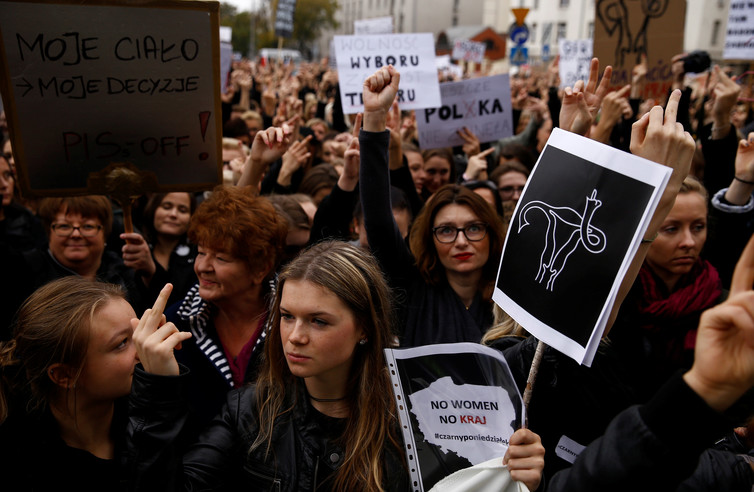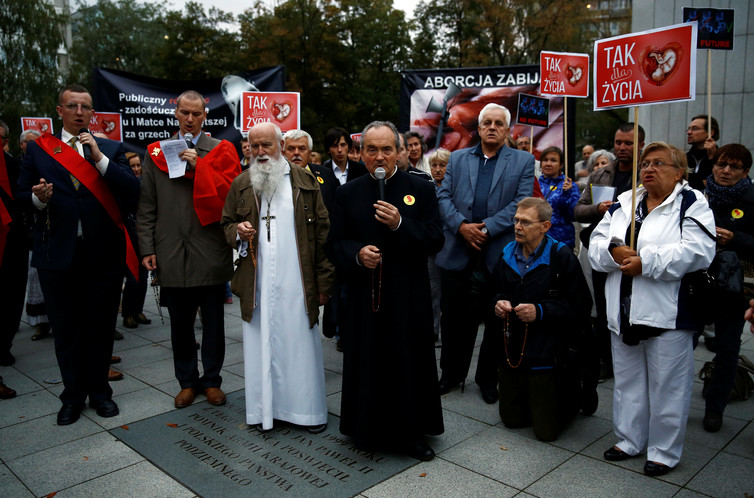
In the women’s movement in Central Europe, there are few moments to celebrate. Polish women successfully preventing a total ban on abortion from coming into law recently was one of them.
While we may praise the success of Polish women’s “black protest“ – where women across the country went on strike and dressed in black to mourn the loss of their reproductive rights – one troubling question remains unanswered.
Why did an EU member state even consider forcing women to carry deformed fetuses and imprisoning doctors for terminating pregnancies?
The popular view voiced by the Polish opposition – that the governing Law and Justice Party (PiS) wants to bring back the Middle Ages – is insufficient. It relies on the “backlash” narrative of women’s emancipation, which sees nations making linear progress towards equality, interrupted by setbacks that can be overcome by joint action.
Luckily, joint action worked in this case. But if progressive groups do not understand the new challenges posed to women’s rights by the illiberal states of Central Europe, future progress may be elusive.

Kacper Pempel/Reuters
The polypore state
In recent years, Hungary and Poland have experienced a series of radical institutional changes aimed at a second transition from liberal to illiberal democracy.
The emergent regimes of Viktor Orbán in Hungary and Beata Szydło in Poland do not represent a revival of authoritarianism, but a new form of governance. This new system stems from the failures of globalisation and neoliberalism, which created states that are weak for the strong, and strong for the weak.
To describe the modus operandi of these new regimes, we have coined a new term: the “polypore” state.
A polypore is a parasitic fungus that feeds on rotting trees, contributing to their decay.
In the same way, the governments of Poland and Hungary feed on the vital resources of their liberal predecessors, and produce a fully dependent state structure in return.
This style of government involves appropriating the institutions, mechanisms and funding channels of the European liberal democratic project.
One widely publicised example in Hungary was a controversial 2011 anti-abortion poster campaign. The campaign was launched as part of a government work-life balance project and as such was funded from the EU employment and social solidarity program, ironically called PROGRESS.
The “polypore state” divests resources from the already existing secular and modernist civil society sector towards the illiberal base, to secure and enlarge it. This year in Poland, the Ministry of Justice denied funding to several progressive women’s and children’s rights NGOs. As noted by the Commissioner for Human Rights, the funds were instead granted to Catholic organisations such as Caritas.
Just as the polypore fungus usually attacks already damaged trees, illiberal regimes rise to power in the context of democratic standards weakened by the financial, security and migration crises.
In Central Europe, post-1989 regime transformation gave preference to economic reform measures over civic and social ones. Liberal norms and practices have never been fully embedded in these societies. This creates a paradoxical situation where illiberal forces have flourished amid an unfinished liberal revolution.
There are three key tenets of this type of government that need to be understood to account for its success: parallel civil society, security narratives, and the family.
Parallel civil society
The goal of illiberal regimes in Central Europe is to transform post-communist infrastructure to benefit the new ruling elite and its voter base.
The key aspect of this transformation is replacing previous civil society and human rights organisations with pro-government NGOs, which support the state’s agenda. While the new groups seemingly have the same profile and target group as the previous ones, they operate within a blatantly different framework that is predominantly religious and anti-modernist.
For instance, there are two key women’s NGOs in Hungary that deal with the role of fathers in families and work-life balance: the long-established, liberal Jol-let and the newly founded, conservative Harom Kiralyfi. Recently only the latter has received signficant state funding for its projects.
Thus the NGO sector is transformed by the distribution of EU and state funding to groups that share the governments’ ideology, leaving progressive organisations reliant on increasingly scarce foreign donations and largely unable to influence domestic policy.

Kacper Pempel/Reuters
Security narratives
To legitimise their disregard for a plural civil society, illiberal governments use the language of security. Human rights groups are framed as foreign-steered and potentially dangerous for national sovereignty.
Gender equality, open society and minority rights are portrayed as an existential threat to the survival of the nation. In 2013, Orbán ordered an investigation into certain Norwegian-funded NGOs, including the Roma Press Centre and Women for Women against Violence, which were accused of being “paid political activists who are trying to help foreign interests”.
The investigation has since been resolved, but not without significant damage being inflicted on many NGOs.
In this context, human rights issues become depoliticised – and advocacy groups are presented as state enemies rather than democratic adversaries.
Privileging family over women’s rights
Hungary and Poland use nationalist ideas about the family to attack human rights, emphasising the rights and interests of “traditional” families over those of individuals and minorities.
Fidesz and PiS, the Hungarian and Polish ruling parties respectively, have both introduced the concept of “family mainstreaming” as central to their policy making. In EU and UN policy literature, family mainstreaming is presented as a tool to identify the impact of policies on families and strengthen the functions of the family. In the hands of illiberal actors, it’s become an alternative to women’s rights and an instrument for promoting “traditional” values.
Women’s issues are gradually substituted with family issues, and institutions responsible for gender equality are replaced with ones dealing with family and demography. In Hungary, the highest coordinating government body for gender equality, the Council of Equal Opportunity of Men and Women, has not convenedsince 2010, and its portfolio has been delegated to the Demographic Roundtable.
This is not a backlash
If not properly recognised, illiberal states can have seriously detrimental consequences for the rights of women and minorities. When the state appropriates previously existing democratic structures, it shuts down opportunities for resistance.
Underfunded, demonised, and operating outside a system of liberal checks and balances, feminists and progressive NGOs are unable to influence government policy through previously existing channels – advocacy, consultations or media.
Illiberalism is not a backlash, after which one can go back to business as usual, but a new form of governance. Sadly, this means the recent success of the women’s protests in Poland might be impossible to sustain.

